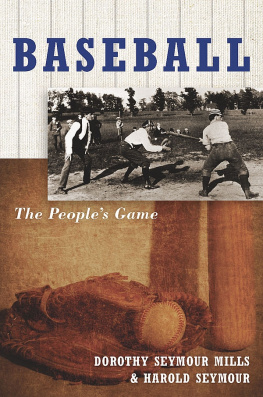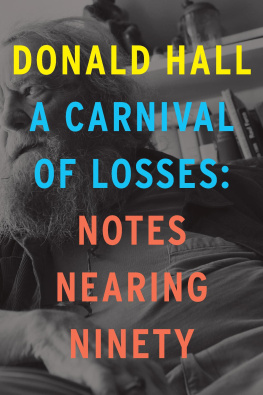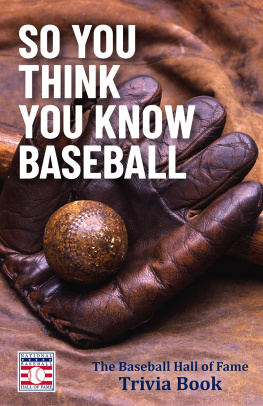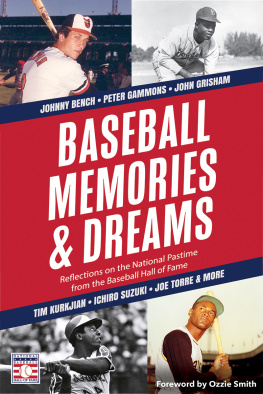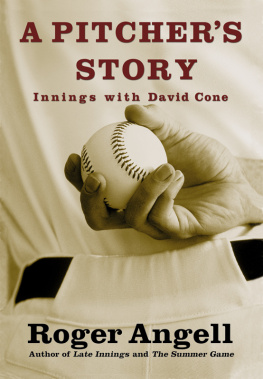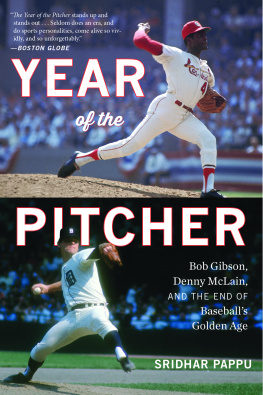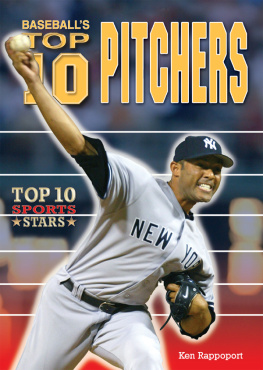IN THE COUNTRY OF BASEBALL
IN THE COUNTRY OF BASEBALL
DONALD HALL
with Dock Ellis

FIRESIDE
Simon & Schuster Building
Rockfeller Center
1230 Avenue of the Americas
New York, New York 10020
Atheneum Books for Young Readers
An imprint of Simon & Schuster Childrens Publishing Division
1230 Avenue of the Americas, New York, New York 10020
www.SimonandSchuster.com
This book is a work of fiction. Any references to historical events, real people, or real locales are used fictitiously. Other names, characters, places, and incidents are products of the authors imagination, and any resemblance to actual events or locales or persons, living or dead, is entirely coincidental.
Copyright 1976, 1989 by Donald Hall
All rights reserved
including the right of reproduction
in whole or in part in any form
First Fireside Edition, 1989
Published by arrangement with the author.
FIRESIDE and colophon are registered trademarks
of Simon & Schuster Inc.
Designed by Stanley S. Drate/Folio Graphics Co. Inc.
Manufactured in the United States of America
1 3 5 7 9 10 8 6 4 2 Pbk.
Library of Congress Cataloging in Publication Data
Hall, Donald, 1928
Dock Ellis in the country of baseball/by Donald Hall, with Dock
Ellis.1st Fireside ed.
p. cm.(Fireside sports classics)
A Fireside book.
1. Ellis. Dock.
2. Baseball playersUnited StatesBiography.
3. Narcotic addictsRehabilitationUnited States.
I. Ellis, Dock.
II. Title.
III. Series.
GV865.E44H34 1989
796.3570924dc19 88-18251
[B) CIP
ISBN 0-671-65988-X Pbk.
ISBN-13: 978-0-6716-5988-2
eISBN-13: 978-1-4391-4602-6
CONTENTS
ONE
The Country of Baseball
TWO
Black Graffiti
THREE
The Season, and Mr. Brewer
FOUR
The Gas Man Keeping It Low
FIVE
Coming Up and Staying Up
SIX
Two Games in July, and One in August
SEVEN
1975
EIGHT
The Adjustment
ONE
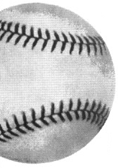 The
The
Country
of
BaseballThe Country of Baseball
Baseball is a country all to itself. It is an old country, like Ruritania, northwest of Bohemia and its seacoast. Steam locomotives puff across trestles and through tunnels. It is a wrong-end-of-the-telescope country, like the landscape people build for model trains, miniature with distance and old age. The citizens wear baggy pinstripes, knickers, and caps. Seasons and teams shift, blur into each other, change radically or appear to change, and restore themselves to old ways again. Citizens retire to farms, in the country of baseball, smoke cigars and reminisce, and all at once they are young players again, lean and intense, running the base paths with filed spikes.
Or they stay in the city, in the capital of the country of baseball. At the mouth of the river, in the city of baseball, young black men wear purple leather maxicoats when they leave the ball park. Slick dressers of the twenties part their hair in the middle and drive roadsters. In old barrios everyone speaks Spanish. Kids playing stickball, and kids running away from cops, change into fierce adults rounding third base in front of fifty thousand people, and change again into old men in their undershirts on front stoops.
Though the grass transforms itself into a plastic rug, though the players speak Arkansas or Japanese, though the radio adds itself to the newspaper, and the television to the radio, though salaries grow from workingmens wages to lawyers compensations, the country remains the same; everything changes, and everything stays the same.
The players are white and black, Cuban and Welsh and Mississippi farmers. The country of baseball is polyglot. They wear great mustaches and swing bottle-shaped bats, and some of them dress eccentrically. John McGraws Giants play two World Series wearing black uniforms. Now the citizens hair shortens, their loose uniforms turn white, their faces turn white also, and the white world cheerswhile on the other side of town, black crowds cheer black ballplayers. Now the hair returnsbeards, handlebar mustaches, long locks hanging beside the catchers mask; now brightly colored knickers cling close to thick legs; now bats are scooped out at the thick end; now black and white play together again.
In the country of baseball, the magistrates are austere and plain-spoken. Many of its citizens are decent and law-abiding, obedient to their elders and to the rules of the community.
But there have always been othersthe mavericks, the eccentrics, the citizens of independent mind. They thrive in the country of baseball. Some of them display with Lucifer the motto, I will not serve. Some of them are known as flakes, and unless they are especially talented bounce from club to club, to retire from the active life sooner than the others. Left-handed pitchers are reputed to be craziest of all, followed by pitchers in general, and left-handers in general. Maybe forty percent of the population in the country of baseball is flaky, at least in the opinion of the other sixty percent.
When Al Hrabosky meditates hate, in his public solitude behind the St. Louis mound, he perpetuates a great tradition.
The country of baseball begins to take shape at the age of six. Earlier, sometimes. Dock Elliss cousin gave him a baseball to hold when Dock was in his crib. But Little League starts at six and stickball and cowpastureball at about the same age. At seven and eight and nine, the players begin to reside wholly in the country of baseball. For the people who will live there forever, the long summers take on formtime and space shaped by the sharp lozenge of the base paths. Then high school, maybe college, maybe rookie league, Class A, Double A, Triple Athe major leagues. In the brief season of maturity, the citizens of this country live in hotels, watch movies, pick up women who lurk for them in lobbies, sign autographs for kids, and climb onto the team bus for the ride to the ball park at five in the afternoon.
In their brief season, they sit for a thousand afternoons in front of their lockers, pull on archaic stockings, set their knickers at the height they affect, and josh and tease their teammates. Tony the trainer measures a tender elbow, tapes an ankle. Then the citizens saunter without urgency onto the field, gloves under arms, and pick up a ball.
Richie Hebner sees Richie Zisk. Hey, he says, want to play catch?
Baseball, they tell us, is part of the entertainment industry.
Well, money changes hands; lawyers make big money; television people and their sponsors make big money. Even the citizens make big money for a while. But like actors and magicians and country singers and poets and ballet dancers, when the citizens claim to be in it for the money, they are only trying to be normal Americans. Nothing is further from the country of baseball than the business life. Although salaries grow and contract clauses multiply, the business of baseball like the business of art is dream.
In the cardboard box business, a bosss expectations rise like a plateau gradually elevated, an infinite ramp leading to retirement on the ghost plains of Arizona. And in the country of cardboard boxes, the manners of Rotary proliferate: the false laughter, the bonhomie of contracts, the golf played with bosss boss. Few flakes survive, in the country of cardboard boxes.
Next page




